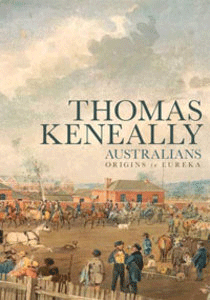Australians, Origins to Eureka by Thomas Keneally

My Year 6 son has a science teacher who loves art. My daughter loved this teacher's classes, but my son feels very ripped off. He loves science, has a fascination with the way things work, is very hands-on… and to learn about science by making posters or drawing pictures is something that makes him feel incompetent. One night at the dinner table he cried out in frustration: "I mean, is it science or is it art?"
People may have the same response to this massive effort by Thomas Keneally: Australians, Origins to Eureka is part 1 of a three-part history of Australia. It is told through the eyes of individuals alive at the time. It begs the question: Is it history or is it story? In some ways it is both. It is carefully researched history but communicated through the means of story.
Keneally has established a narrative history, building substantially on two earlier nor fiction books, largely about the Irish Catholic influence on early Australia. His work is somewhat biased toward Irish Catholicism, which is natural because of his background. It is true also that Irish Catholics, including many priests, were transported to Australia because of their rebellious views and actions. They found in Australia the opportunity to establish some of the ideals that had failed at home and pushed for recognition of convict rights’, emancipation or freedom, universal voting rights and the right to collective representation, or trade unionism.
Keneally is fascinated that the sometimes brutal, immoral beginnings of Australia transformed to a mostly peaceful, strongly democratic society.
He explores these ideas through telling stories, and has deliberately chosen stories of everyday people, like convict Sarah Devonport whose son was killed accidentally when hot gruel was poured on him on the ship coming over. She had a miscarriage, probably brought on by her grief, but rallied and went on to serve the women around her, often as a midwife. He does include significant people, like the governors, but he likes to tell stories not often reported elsewhere.
He particularly brings to light the sexually liberal practices in the early years of Australian society. It appears that most of the leading figures had convict housekeeper/lovers.
What is lacking is an emphasis on the evangelical history of Australia. The significant prayers of those in England for the great mission work in Australia. The activities of William Wilberforce in helping to fund evangelical missionaries to Australia, including the first chaplain Richard Johnson and the infamous Samuel Marsden.
Keneally mentions the Johnson’s pet kittens, but fails to describe his great concern for the convicts, his one-to-one visits, care for the sicks, and advocacy. He repeats the well-known description of Marsden as the flogging parson, while neglecting to mention his particular concern to provide for the needs of women in the colony, who often resorted to prostitution to survive. Marsden also established several successful missionary journeys to New Zealand. This sometimes hidden history of Australia can be found in Stuart Piggin’s book Spirit of a Nation.
Perhaps it is unfair to look for what is missing, when there is much that is rich and interesting in this book. Keneally has started from pre-Aboriginal times, and has captured the often cruel history of Aboriginal-settler relations, while retaining a context of the scientific and philosophical views of the times.
His book is incredibly readable, and vivid. He has received virtually universal endorsement, including the Prime Minister, Kevin Rudd, who launched the book in Parliament House with an excellent speech.
It is a remarkable thing that by the 1850s, the period when this book ends, Australia’s penal beginning had been as Keneally says, “transmuted into a diverse future, in which Australians would bravely attempt to live down the origins of their society.”
In the end in these stories we see the best and worst of the human story. Great acts of courage and imagination, and much sexual abuse and physical brutality; but we also see strains of what we like to celebrate in Australians: a sense of the larrikin, seeing all as equal, celebrating success, persevering through difficulties, welcoming new ideas.
While Piggin contrasts the beginning of Australia with the beginning of America where the latter was seen as the promised land, while the convicts saw Australia as God-forsaken; Keneally celebrates the spirit of social justice that ran strong through this land; acknowledging that often it had Gospel roots.
This book is a welcome addition to a crowded shelf of histories. While obviously well-researched, it does not pretend to be scholarly, does not present a range of views, but is also eminently more readable than many of the other history books!
KARA MARTIN is a lecturer with School of Christian Studies (www.socs.org.au), and is an avid reader and book group attendee. Kara does book reviews for Hope 1032's Open House (www.theopenhouse.net.au).






















